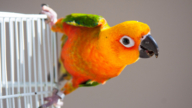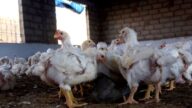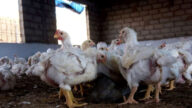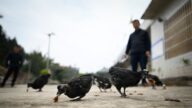【新唐人2013年04月12日讯】据大陆官方报导,中科院声称,通过研究发现,H7N9禽流感病毒来自于野鸟和家禽中的禽流感病毒基因重配,对人致病是极小概率的随机事件,应该不会造成大面积传播。但这种说法完全无法令民众信服,并遭到大量网友的反驳。海外专家指出,“概率小”这种说法本身不符合病毒学,也不负责任。
据《新华社》和《央视》新闻联播报导,中国科学院微生物所研究结果显示,H7N9禽流感病毒基因来自于东亚地区野鸟和中国上海、浙江、江苏鸡群的基因重配。中科院声称,这种基因重配是一种常见现象,但对人类致病,是极小概率的随机事件,不会造成大病毒、大范围传播。但这种说法遭到了专家的驳斥。
美国华盛顿DC病毒学专家医学博士林晓旭:“这不是一个概率的问题,这个说法本身就不是符合病毒学的说法,没有人这么说。而且什么‘概率性很小’,这个说法本身就不是很专业的一种说法,你怎么算这个概率呢?现在对这个病毒有什么研究结果啊,我没有看到有任何确切的实验数据报导出来啊﹗所以他说的研究结果是什么啊?”
一位自称学术界的网友炮轰中科院,他说,作为一个科学工作者,连一个科学的严谨性都没有吗?有脸说“随机事件”,既然是“概率”,就要有一个百分比的数字。几率无论多小,这个都是有论证的。而就算小,什么是小?一个正规的学术报告绝对不会只写小。而是拿到实际数据后对比性的去写。
这名网友还说,既然没研究清楚,就回去实验室研究去。不懂,就不要瞎出来说。
而另一位网友则犀利的指出,中共当局强调中科院的“概率说”,就是企图利用群众对一些科学概念的无知,从而误导民众,以达到掩盖真相的目地。只是没想到,百姓已经越来越难“糊弄”了。
江苏常州周先生:“他们政府一贯是这样的,没有什么公信力了。中国可能隐瞒事实还是比较很多,公开的信息并不是很多,按照惯例,如果它 公布了死多少人,起码它要隐瞒十倍吧!”
山东烟台网友(甄的忘不了)说:想起非典时期,卫生部请的世界卫生组织官员来,在广州作秀,宣称非典不传染,找了几个群众演员装作治愈出院病人,蒙骗全国人民,后来摀不住了,后果大家都知道了…。
北京“益仁平中心”负责人 陆军:“政府会认为真实情况如果是被披露出来的话,可能会引起公众的恐慌,不利于所谓的社会的稳定,但其实呢恰恰这个逻辑是完全错误的。政府他隐瞒真相,掩盖信息,反而会使公众对于自己所处的状况到底有多危险,感到心里没底,同时也会对政府的公信力产生质疑,而最终的这种恐慌和质疑的情绪反而带来不稳定。”
美国华盛顿DC病毒学专家医学博士林晓旭:“政府要想避免民众恐慌,我觉得就是要讯息更多透明,把更多检测到的样品的数据啊、更多的疑似病例啊,这些事情都公布出来,让社会上能够更了解整个情况,这样就好了。”
据了解,这次的H7N9禽流感病毒在禽类身上呈现弱毒性,在人身上却极具破坏力。专家分析:病毒自身基因变异,可能是H7N9型禽流感病毒感染人,并导致高死亡率的原因。同时,据中国科技部最新消息说,将会在7个月内完成研制H7N9禽流感预防性疫苗。但民众依然觉得时间过长。
Is H7N9’s Infection Probability Small?
According to Mainland official reports, the Chinese
Academy of Sciences claimed that through research,
it was found that the H7N9 avian virus comes from
wild birds and domestic poultry,
proposing only a small probability of infecting
human beings, and should not cause a large-scale spread.
But this message has not convinced the public,
and many netizens refute it.
Overseas experts point out that “small probability” itself
does not follow the principles of virology.
It is also irresponsible to suggest it.
According to the Xinhua News and CCTV News Network,
the Institute of Microbiology at the Chinese Academy
of Science found that genes of the H7N9 virus come from
wild birds of East Asia and domestic poultry from Shanghai,
Zhejiang and Jiangsu Provinces.
It is a result of gene re-assortment.
However, there is an extremely small probability
of a random incident of infecting human beings;
it will not become a serious pathogen or cause
wide dissemination.
Yet, this idea has met refutation from other virologists.
Dr. Lin Xiaoxu, a virologist in US:
“This is not a question of probability.
This argument is not in line with the principles of virology.
No one would make such remarks.
It is very unprofessional.
How do you calculate the probability?
What kinds of findings of this disease do they have?
Where are the data and reports?
What research results do they have?"
A self-proclaimed academic netizen:
“As scientists, they lack preciseness.
If you dare mention probability and random events,
you need to show a percentage figure.
What is a small probability?
No matter how small, one has to validate it with data.
A formal academic report will not use just the word small,’
but provide data to illustrate the point.
He added, “If you don’t know for sure, go back
to the laboratory. Don’t come up with nonsense.”
Another netizen sharply pointed out that Chinese official
attempt to misguide the public, who lack scientific concepts,
and thus, reach their goal of hiding the truth.
They didn’t expect the public to become harder to fool.
Mr. Chow from Zhangzhou, Jiangsu:
“Our government has always been like this.
They have no credibility and like to conceal the truth.
We have very little public information.
In accordance with established practice, the death cases
will be ten times what they have announced.”
Shandong Yantai netizen: “During the SARS period,
the Ministry of Health invited WHO officials
to put on a show in Guangzhou, claiming that
SARS is not contagious.
They found a few actors to play cured SARS patients
to fool the entire Chinese population.
Later, they could no longer hide the facts,
and everyone learned the truth.”
Lu Jun, director of Beijing Yi Ren Ping Center:
“Our Government thinks the truth will cause public panic
and is not good for social stability.
In reality, it is just the opposite.
This kind of logic is totally wrong.
When our government conceals the real situation,
the public will be afraid of the unforeseen danger
they would be facing.
Then, they lose confidence in the government.
Their fear and doubt will definitely bring instability.
Dr. Lin Xiaoxu: “If the Government wants to avoid public
panic, it should be more transparent, test more samples,
and publicize more data and more suspected cases.
Let the society understand the whole situation."
It is understood that the H7N9 avian influenza virus in birds
shows only weak toxicity, but in humans, it is devastating.
Experts state that the viral gene mutation may be the cause
of human infection and of the high mortality.
Meanwhile, the Chinese Ministry of Science and Technology
says a vaccine against the H7N9 will be developed within seven months.
But, the public feels that seven months is much too long.




























